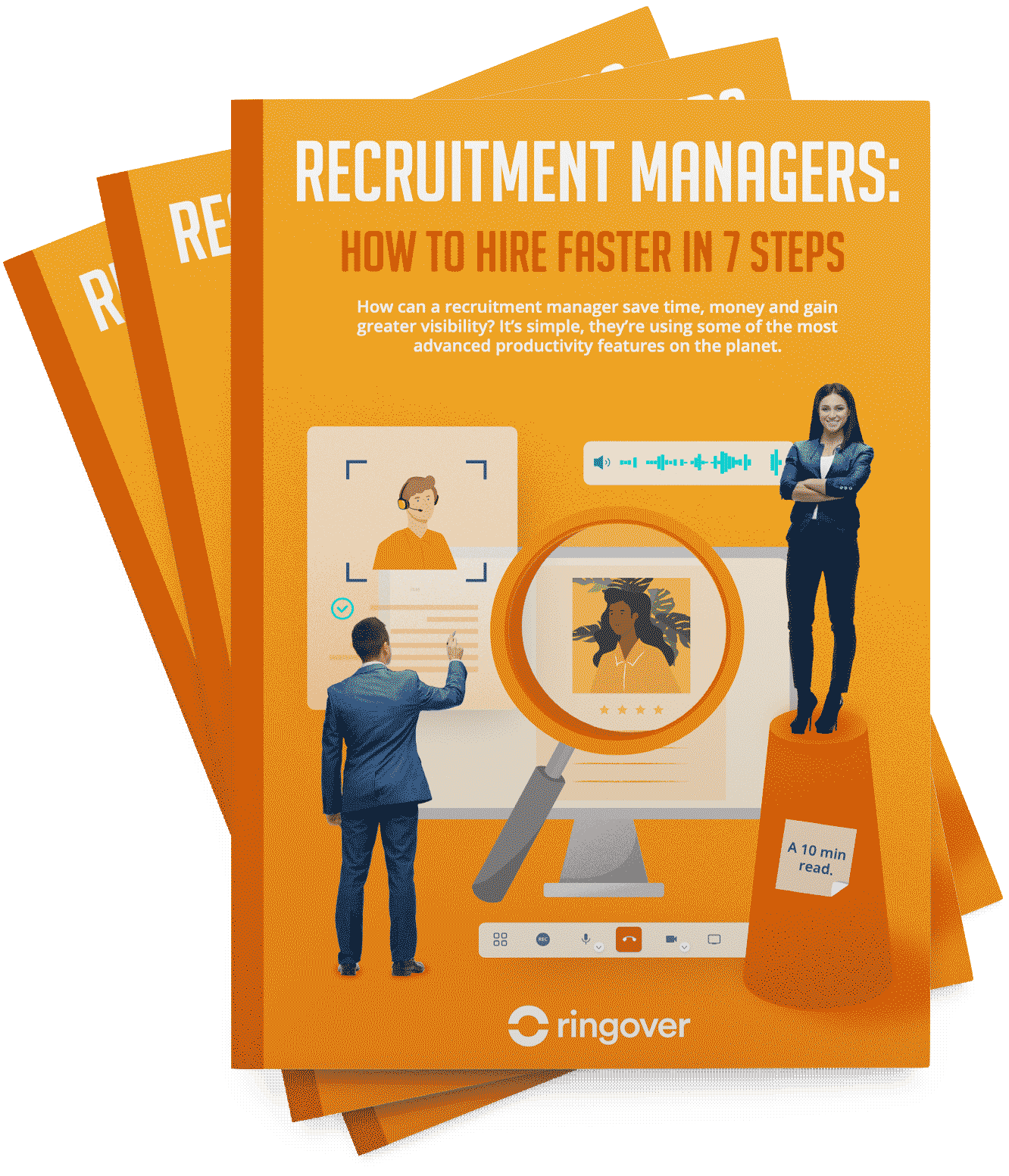Summary
Resume parsing software utilizes advanced parsing technology, often powered by machine learning and natural language processing (NLP), to automatically extract and organize resume data from a large number of resumes and CVs. Instead of manually reviewing countless documents, this parsing process converts unstructured candidate information—such as work experience, skills, education, contact details, and relevant job titles—into structured, searchable data fields.
Discover Ringover for Recruiting & Staffing
This allows recruiters and hiring managers to efficiently filter, sort, and match candidates to job requirements within an applicant tracking system (ATS). In essence, resume parsing streamlines the recruitment process by reducing the time spent on manual reviews, improving accuracy, and helping recruiters identify the best candidates more quickly.
What is Resume Parsing? A Definition
Resume parsing software utilizes advanced parsing technology, often powered by machine learning and NLP, to automatically extract and organize resume data from a large number of resumes and CVs. Instead of manually reviewing countless documents, this parsing process converts unstructured candidate information—such as work experience, skills, education, contact details, and relevant job titles—into structured, searchable data fields.
Essentially, it transforms unstructured documents—whether submitted as PDFs, Word documents, or even scanned images—into searchable digital profiles suitable for further processing in ATS.
This allows recruiters and hiring managers to efficiently filter, sort, and match candidates to job requirements within an ATS.
Ringover's business phone system supports seamless communication with both candidates and clients via powerful VoIP phone features.
The process typically involves several steps: first, the parsing software extracts raw text from resumes, cleansing it by removing formatting and irrelevant elements. Then, it classifies the content into predefined categories like job titles and contact details.
Modern parsers go beyond simple keyword matching by understanding the context and relationships within the information, enhancing accuracy and minimizing manual sorting errors. This capability allows recruiters to efficiently sift through large volumes of resume data during the recruitment process and identify the most suitable candidates quickly.
In practical terms, resume parsing software streamlines the workflow for recruiters by automating the extraction and structuring of candidate information. This makes it easier to integrate with tracking systems ATS and other parsing tools, supporting a more effective, data-driven recruitment strategy. As a result, recruiters can save valuable time and reduce administrative work while improving the quality of their candidate searches and selections.
How Does Resume Parsing Work?
The resume parsing process begins the moment a candidate uploads their resume in various file formats like PDF, Word, HTML, or RTF. If the resume is an image or scanned document, Optical Character Recognition (OCR) technology converts it into editable text.
Next, the parsing software strips away all formatting elements such as colors, graphics, or borders to focus solely on the raw text content.
Then, using advanced algorithms powered by NLP and machine learning, the parser identifies and organizes content into distinct categories such as contact details, work experience, education, skills, and other relevant data fields. These algorithms are designed to understand context, so variations in phrasing or resume layout won't confuse the system. The extracted structured data is then formatted—commonly into JSON or XML—and fed into the ATS for easy searching, filtering, and evaluation by recruiters.
Many resume parsing software solutions enhance the efficiency of the recruitment workflow through integrations with other business tools. Popular parsing software includes RChilli, HireAbility, Textkernel, and Sovren.
These tools not only excel in extracting detailed candidate information across hundreds of data points but also support bulk import and multi-language parsing capabilities.
Additionally, integrations with omnichannel communication software and productivity platforms (like Salesforce) amplify their impact. For instance, the business phone system Ringover can integrate with ATS like Bullhorn, Vincere, Jobadder, and more to streamline candidate outreach by linking the parsed contact information directly with calling features like unlimited calling, click-to-call, call campaigns, and more.
Moreover, conversational AI tools like Empower by Ringover can automate candidate engagement through text or voice interactions, freeing recruiters to focus on strategic decisions rather than administrative tasks. This ecosystem of parsing technology coupled with communication automation significantly accelerates the overall recruitment process, improving response time and candidate experience.
Benefits of Resume Parsing For Recruiters and Candidates
Resume parsing technology offers a wide range of benefits that improve the efficiency and accuracy of the recruitment process for both recruiters and candidates. For recruiters, one of the most significant advantages is the incredible time savings.
Automated parsing software swiftly analyzes hundreds or even thousands of resumes, extracting critical data fields such as skills, work experience, and education without the need for manual review. This allows hiring teams to focus on interviewing and engaging with the most qualified candidates rather than spending countless hours sorting documents.
Accuracy and consistency are other key benefits. By relying on AI-driven parsing tools, recruiters can eliminate human errors and biases that naturally occur when manually scanning resumes. The technology standardizes the information, ensuring that no important qualifications or details are overlooked and that comparisons across candidates remain fair and reliable.
Resume parsing also enhances organization. The structured data can be stored and searched easily within various ATS, allowing recruiters to quickly filter candidates based on specific criteria such as years of experience or niche skills.
This level of organization boosts productivity and helps maintain clear hiring standards throughout the candidate review process.
From the candidate's perspective, resume parsing improves the application experience. Many platforms implement "one-click apply" features powered by parsing technology, enabling applicants to submit their information effortlessly. This encourages more candidates to apply, broadening the talent pool and increasing their chances of being noticed.
Additionally, resume parsers often support multiple file formats and can even analyze social media profiles, providing candidates with more flexibility in how they present their professional background.
Ultimately, resume parsing software saves companies costs by automating labor-intensive tasks and allows teams to handle higher volumes of applications effectively. It ensures the right candidates are identified quickly, helping organizations hire top talent faster and with greater confidence.
Concluding Thoughts: What is Resume Parsing?
Resume parsing is a powerful tool that revolutionizes how recruiters handle candidate resume data. It makes the hiring process faster, more accurate, and efficient. By automating the extraction of details such as skills, work experience, and education, resume parsing software allows recruiters to save time, reduce costs, and enhance candidate evaluation.
Additionally, it enhances the overall candidate experience by enabling quicker response times. If you aim to streamline your recruitment workflow and make smarter hiring decisions, integrating resume parsing technology into your ATS is essential.
What is Resume Parsing FAQ
What does parsing a resume mean?
Parsing a resume refers to the use of software to automatically extract and organize key details—such as contact information, work history, education, and skills—from a candidate's resume into a structured digital format. This process helps recruiters search and evaluate candidates more efficiently.
What does "don't parse my resume" mean?
When someone states "don't parse my resume," it means they prefer that their resume content is not processed or altered by parsing software. This could be due to concerns about data extraction errors or the need to preserve the original formatting and details as submitted.
What does it mean to parse a job?
Parsing a job involves the automated extraction of relevant information from job descriptions—such as required skills, job titles, responsibilities, and qualifications—into a structured format. This process helps ATS match candidate resumes more effectively to job requirements.
What is resume parsing in ATS?
In an ATS, resume parsing is the automated process of converting uploaded resumes into structured, searchable data. This enables the ATS to organize candidate information consistently, perform keyword searches, and streamline recruitment workflows by quickly identifying qualified applicants.
What does parse resume fail mean?
"Parse resume fail" occurs when resume parsing software cannot correctly extract or structure data from a submitted resume. This issue can result from poor document quality, unusual formatting, unsupported file types, or incomplete information. In such cases, manual review or re-submission in a compatible format may be necessary.
Published on July 7, 2025.



